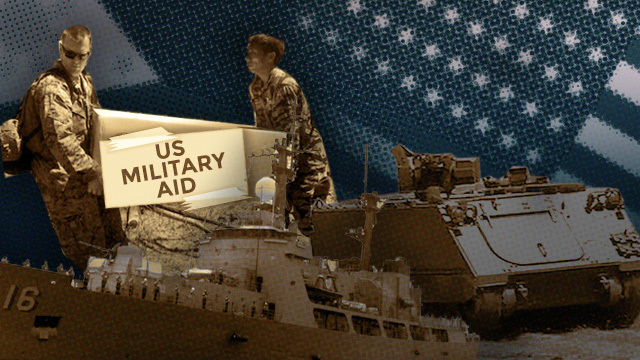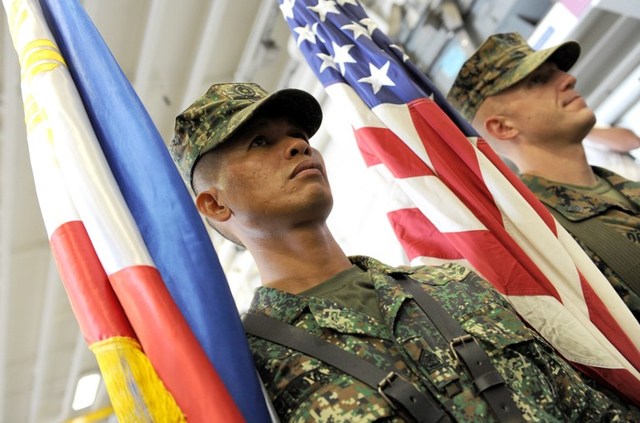Regular war games have synchronized the tactics, techniques, and procedures of the two militaries, allowing the Americans to quickly respond in the aftermath of typhoon Yolanda while other foreign militaries struggled to assist

President Rodrigo Duterte's plan to terminate war games between the Philippines and the US, a move that would significantly push his pivot to China, could hurt the capabilities of the Philippine military that has closely worked with the Americans for decades.
Outside the West Philippine Sea (South China Sea) conflict, the two militaries cooperate on disaster response and counter-terrorism.
The Philippines and the US also regularly hold two major exercises annually.
On top of this, the US allocated this year at least US$40 million (about P2 billion*) in military assistance to the Philippines, which will also receive more hand-me-down assets such as a 3rd warship and at least one more C130 cargo plane.
But Duterte said the country will buy defense assets from China and Russia instead of the US, which has already donated or sold to the the AFP some of its most capable defense assets such as two warships patrolling the West Philippine Sea, armored personnel carrires for the army, and a research vessel (Click here for list of big ticket items from the US).
Synchronized moves
Years of regular war games have synchronized the tactics, techniques, and procedures to make command posts – generals issuing orders – and the troops of the longtime allies interoperable.
Recent exercises were in fact focused on the maritime conflict, allowing the swift deployment of joint patrols to deter threats of China's construction in Scarborough Shoal off the coast of the country's mainland Luzon.
"Perhaps the President may reconsider to allow the holding of non-traditional exercises like humanitarian assistance and disaster response (HADR), counter-terrorism, and other transnational crimes like drug trafficking under the Security Engagement Board (SEB)," said former Visiting Forces Agreement (VFA) executive director and retired Armed Forces of the Philippines chief Eduardo Oban Jr.
Oban said it is important to proceed with these exercises even if war games such as joint patrols and live fire exercises are discontinued. He said training exercises may even include joint efforts against drug trafficking.
The interoperability between the US and the Philippines proved crucial in the aftermath of the November 2013 Super Typhoon Yolanda, when American soldiers were among those who took the first C130 cargo flight to Tacloban City to check the extent of damage and determine forms of assistance.
The US deployed 12,000 troops to the Visayas after Yolanda, pulling out of the area only 4 weeks later.
“When Yolanda happened, the first responders were the AFP and the US forces. Together they established a comand post in strategic locations, where they served as the hub of relief and rehabilitation operations," Oban recalled.
Developing the same interoperability with a new ally "will take time," said a retired general concerned with the policy shift but who refused to be identified.
China belatedly sent a hospital ship then, following international criticism over its failure to aid a neighbor.
Anti-terror drive

SIDE BY SIDE. US and Philippine soldiers regularly hold Balikatan and Phiblex war games in the Philippines. File photo by AFP/Jay Directo
Americans are also assisting the country's anti-terrorism drive, training elite troops and sharing intelligence and technology, although this was tainted by the bloody Mamasapano incident in January 2015, an operation that involved American intelligence and the participation of elite Philippine cops.
A Senate probe into Mamasapano later showed that one of the 6 American soldiers who tagged along the ground Filipino police commander had tried to order the military around. "One of the Americans ordered [Army Major General] Pangilinan to fire the artillery. However, Pangilinan refused and told him, 'Do not dictate to me what to do. I am the commander here!'"revealed the complete draft of the Senate report released on March 17, 2015.
Prior to this, in March 2012, the Philippine military used US smart bombs in an attack against the Abu Sayyaf in Sulu. Various intelligence reports obtained by Rappler said that the first smart bombs, PGMs or Precision-Guided Munitions kits, arrived in the Philippines on November 1, 2010. Weapons training began the following year, on Jan 24, 2011. (READ: US smart bomb used in Sulu attack)
These forms of involvement reinforce criticism of American presence in the Philippines. (READ: Independent foreign policy: It's about time)
First left Philippine president
Duterte, a self-declared "first leftist president," has never hidden his dislike of Americans even before he fumed over the superpower's criticism of his deadly war on drugs.
When he was mayor of Davao City, Duterte exposed and blocked US plans to use his city as base of its drone operations.
As president, he said he doesn't want any more joint exercises with US forces. "Hindi natin kaya ang China sabi ko (We are no match to China)— even with the help of America – so we talk.... I am not ready to commit the soldiers of this country just to be massacred," Duterte said during a recent trip to Vietnam.
The Americans have made informal inquiries to clarify Duterte's pronouncements, but Defense Secretary Delfin Lorenza said no action will be taken until the President gives them clear orders. Foreign Secretary Perfecto Yasay Jr denied the President ever talked about stopping the exercises, claiming Duterte only meant to end joint patrols.
The pronouncements have also raised questions about the President's plans regarding a new military-to-military agreement, the Enhanced Defence Cooperation Agreement, that allows Americans to put up facilities and preposition assets inside Philippine military bases and which has been upheld by the Philippine Supreme Court as constitutional.
Yes to China's preconditions
Jay Batongbacal, who heads the University of the Philippines Institute for Maritime Affairs and Law of the Sea, said Duterte's pronouncements "signal" that he is "ready to grant China's pre-conditions for negotiation of a settlement of the West Philippine Sea issues: principally on China's terms and without the supporting role of the US." (READ: Sun rises 'beautifully' on Philippine ties – China envoy)
Apart from terminating war games, Duterte also seeks to end joint patrols within the country's exclusive economic zone and limit unliateral patrols to the country's 12 nautical mile territorial zones.
Former foreigh affairs secretary Albert Del Rosario warned of the economic cost of the foreign policy shift, arguing that the Philipipnes should keep "as many friends as possible."
It was, ironically, the same criticism hurled by some camps against the Aquino administration, which cut communication lines with China over the West Philippine Sea conflict, negotiated EDCA to rely on the US to defend its maritime territories, and won a historic arbitration case against China.
Kabayan party-list representative Harry Roque, who argued against EDCA before the Supreme Court, said Duterte is "warming up to China because he wants to solve the problem of fishermen in Scarborough."
"It is important to stress to China, so that we can come to an immediate solution to the problem of our fishermen in the West Philippine Sea, that we have a separation of national interests with the US. I'm in favor of elimination these war games," said Roque.
Indeed, Duterte's friendliness is credited for the slowdown in China's buildup in the West Philippine Sea. But it is believed to be temporary.
"No matter what comes of discussions between China and the Philippines, the long-term objective of control of the South China Sea remains," said a New York Times report quoting Renmin University international relations professor Shi Yinhong.
Time will tell whose approach is right.
http://www.rappler.com/newsbreak/in-depth/147783-duterte-pivot-china-military-war-games

No comments:
Post a Comment
Note: Only a member of this blog may post a comment.